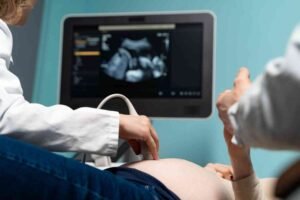Ectopic Pregnancy: Causes, Signs and Treatment
Pregnancy is often seen as one of the most exciting and anticipated events in a person’s life. The idea of new life growing within, the promise of parenthood, and the many dreams associated with welcoming a child into the world are beautiful. However, not all pregnancies proceed as expected, and sometimes complications arise, like ectopic pregnancy.
An ectopic pregnancy can be unexpected, frightening, and emotionally overwhelming. If you or someone you know is concerned about this condition, it helps to understand what exactly it means, why it happens, what signs to look for, and the treatment options available. Let’s explore these topics together.
What Is an Ectopic Pregnancy?
An ectopic pregnancy occurs when a fertilized egg implants itself outside the uterus, where it should normally grow. Most commonly, this happens in the fallopian tubes, though it can also occur in the cervix, ovary, or abdomen. The fallopian tubes are designed to transport eggs from the ovaries to the uterus but are not equipped to support a growing pregnancy.
In a typical pregnancy, the fertilized egg travels down the fallopian tube and implants in the uterine lining, where it receives nutrients and space to develop. However, in an ectopic pregnancy, the fertilized egg never makes it to the uterus. Because of this, it can’t develop properly, and the condition can become life-threatening for the person carrying the pregnancy if not treated quickly.
Why Does an Ectopic Pregnancy Happen?
While the exact cause of an ectopic pregnancy isn’t always known, several factors can increase the risk. Here are a few potential causes and risk factors:
1. Damage to the Fallopian Tubes
One of the most common reasons for ectopic pregnancy is damage to the fallopian tubes. When the tubes are damaged, scarred, or blocked, the fertilized egg may not pass through properly. This can be caused by:
– Pelvic Inflammatory Disease (PID): This is often a result of untreated sexually transmitted infections (STIs) like chlamydia or gonorrhea. PID can cause inflammation and scarring in the reproductive organs.
– Previous Surgery on the Fallopian Tubes: Any surgery on or near the fallopian tubes, such as for tubal ligation (getting your tubes tied) or to repair damage, can leave scarring or adhesions.

2. Hormonal Imbalances
Hormonal factors can also influence the ability of the egg to travel through the fallopian tubes. Conditions like polycystic ovary syndrome (PCOS) or thyroid issues may disrupt hormone levels, increasing the risk of ectopic pregnancy.
3. History of Ectopic Pregnancy
If you’ve had an ectopic pregnancy before, your chances of experiencing it again are higher. Once the fallopian tubes have been damaged, the risk increases for future pregnancies to implant abnormally.
4. Fertility Treatments
Assisted reproductive technologies (ART), such as in vitro fertilization (IVF), can slightly increase the risk of ectopic pregnancy. This is because multiple eggs are fertilized and implanted, and sometimes, an egg may implant outside the uterus.
5. Smoking
Smoking is another factor that may contribute to ectopic pregnancy. Research suggests that smoking can harm the fallopian tubes by reducing their function, making it harder for the fertilized egg to travel to the uterus.

Signs and Symptoms of an Ectopic Pregnancy
If you’re pregnant, it’s essential to be aware of the signs and symptoms of an ectopic pregnancy. Because the condition can become dangerous if not addressed promptly, early recognition is crucial.
1. Abdominal Pain
Pain in the abdomen, particularly on one side, is one of the most common symptoms. This pain may be sharp or dull and can intensify over time. Sometimes, the pain might start suddenly and become severe. Since the fallopian tube can’t stretch like the uterus, as the pregnancy grows, it can cause significant discomfort.
2. Vaginal Bleeding
Light vaginal bleeding or spotting can occur in an ectopic pregnancy. It may be easy to mistake this for a light period, especially early on. The bleeding might range from light pink to deep red.
3. Shoulder Pain
Shoulder pain can seem unrelated, but it is a key symptom of ectopic pregnancy if accompanied by other signs. This pain occurs due to irritation of the diaphragm caused by internal bleeding, which can press on the nerves that radiate to the shoulder.
4. Dizziness or Weakness
As the pregnancy grows, internal bleeding may occur if the fallopian tube ruptures. This can lead to dizziness, fainting, or a feeling of weakness. A ruptured tube is a medical emergency and requires immediate attention.
5. Gastrointestinal Symptoms
In some cases, an ectopic pregnancy might cause nausea, vomiting, or diarrhea, which can be confused with other gastrointestinal issues.
When to Seek Medical Help
If you experience any combination of these symptoms, especially if you’re already aware of your pregnancy or suspect you might be pregnant, it’s vital to seek medical attention immediately. An ectopic pregnancy, if untreated, can rupture the fallopian tube, causing severe bleeding, which is life-threatening.
Diagnosis of Ectopic Pregnancy
Ectopic pregnancies are diagnosed through a combination of medical exams and tests. If you’re experiencing symptoms, your doctor may conduct the following:
1. Pelvic Exam
A physical examination may be done to check for tenderness in the abdomen or pelvic area. This helps the doctor determine if there are signs of an abnormal pregnancy.
2. Ultrasound
A transvaginal ultrasound is one of the most effective ways to diagnose an ectopic pregnancy. It allows the doctor to visualize the uterus and fallopian tubes, confirming the location of the pregnancy. If no pregnancy is found in the uterus, but the patient is pregnant, it raises suspicion for ectopic implantation.

3. Blood Tests
Blood tests can measure the levels of the pregnancy hormone human chorionic gonadotropin (hCG). In a normal pregnancy, hCG levels rise consistently. In an ectopic pregnancy, the rise in hCG may be slower than expected.
Treatment Options for Ectopic Pregnancy
If you’re diagnosed with an ectopic pregnancy, there are several treatment options. The best approach depends on how early the pregnancy is detected and your specific health circumstances.
1. Medications
If caught early, an ectopic pregnancy may be treated with medication, most commonly methotrexate. This drug works by stopping the growth of the pregnancy and allowing the body to absorb the tissue naturally over time. Methotrexate is usually used when the fallopian tube hasn’t ruptured and the pregnancy is still small.
After receiving methotrexate, the patient will have follow-up appointments to ensure the treatment works and the pregnancy hormone (hCG) levels drop. This non-surgical approach helps preserve the fallopian tube and fertility.
2. Surgery
If the pregnancy has advanced or if there’s a risk of rupture, surgery is often necessary. There are two types of surgery used to treat ectopic pregnancies:
– Laparoscopy: This is a minimally invasive surgery where a small incision is made in the abdomen. A thin tube with a camera (laparoscope) is inserted, and the ectopic pregnancy is removed from the fallopian tube. If possible, the tube is repaired to preserve it.
– Laparotomy: In cases where a rupture has occurred or there’s significant internal bleeding, a more invasive surgery called a laparotomy may be performed. This procedure involves a larger incision and may require removing the fallopian tube entirely to prevent further complications.
3. Expectant Management
In rare cases, if the ectopic pregnancy is very small and not causing immediate danger, your doctor might suggest a “watch and wait” approach. In these situations, regular monitoring of hCG levels is done to see if the body resolves the pregnancy naturally without intervention. This approach is used with extreme caution and isn’t a common treatment.
Emotional Impact and Support
An ectopic pregnancy is more than just a medical condition; it often comes with emotional and psychological challenges. The loss of a pregnancy, especially when it happens unexpectedly and in a life-threatening way, can be deeply traumatic.
If you or someone you care about has experienced an ectopic pregnancy, it’s important to seek emotional support. Talking to a therapist, joining a support group, or leaning on loved ones can help process the grief and fear associated with the experience.

Future Pregnancy After an Ectopic Pregnancy
The good news is that most people who have experienced an ectopic pregnancy can still have a healthy pregnancy in the future. Your chances of conceiving again depend on several factors, such as whether one or both fallopian tubes are intact, your overall health, and whether you’ve had previous fertility challenges.
If one fallopian tube remains after surgery, the other tube can still transport eggs, allowing for a natural pregnancy. Even if both fallopian tubes are damaged or removed, fertility treatments like IVF can still offer a path to pregnancy.
It’s essential to work with your healthcare provider to create a plan for future pregnancies. They may recommend early monitoring in subsequent pregnancies to ensure that the fertilized egg implants in the uterus.
Conclusion
Ectopic pregnancy is a serious medical condition that can feel overwhelming, but understanding the causes, symptoms, and treatment options can help you navigate it with more confidence. Early detection and prompt treatment are critical in ensuring the best possible outcome and preserving future fertility.
Whether you’re looking to protect your reproductive health or support someone going through it, knowledge is a powerful tool. Stay informed and seek help when needed.


